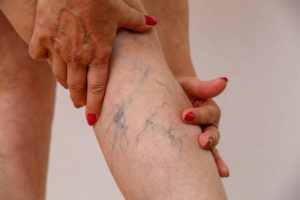
Varicose veins are unsightly, confusing, disheartening, and can even become painful. They are the result of damaged blood vessels and generally indicate poor vein health. They appear when valves in the veins of your legs, which work against gravity by pushing blood upwards, become damaged.
The damage allows blood to leak back down and flow backward to pool in the vein, resulting in twists, stretching, discoloration, swelling, or pain. Vein damage is normal with age, but varicose veins are not a guarantee. There are certain things you can do to reduce the chances of varicose veins and improve overall vein health.
Exercise is probably the best way to encourage healthy veins. When blood is regularly flowing down through your arteries and back to the heart through veins, they remain elastic, less susceptible to pools, and are generally under less pressure.
On the other hand, spending a lot of time seated in the same position can encourage varicose veins. If you do spend a lot of time sitting, get up and change positions regularly. The same goes for those who stand in the same position for extended periods. Moving your legs regularly prevents the likelihood of pooling.
Movement is so important in preventing varicose veins because muscle contractions in your legs—which occur whenever they move—act as a pump to push blood through your veins.
There are also foods that encourage vein health. Foods rich in potassium, flavonoids, and are low in sodium can also encourage optimal blood flow. Water retention plays a major role in blood flow, and too much water can put pressure on blood vessels. Potassium helps prevent water retention.
You can limit sodium by cutting back on processed foods and boosting the intake of potassium-rich foods like almonds or pistachios, leafy greens, lentils, salmon, and tuna.
Flavonoid antioxidants are associated with improved circulation and a relaxing effect on blood vessels. Flavonoids are abundant in vegetables in a number of fruits and vegetables.
These techniques may also help treat varicose veins, too.
Healthy veins are a key component of a healthy circulatory system. Working to prevent varicose veins, and treat them if they arise, can help promote healthy veins and a healthy heart.